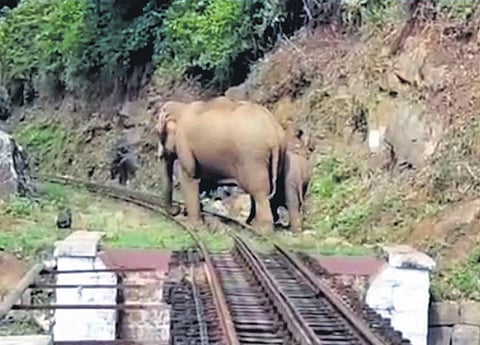

COIMBATORE: A solution to prevent wild elephant deaths on railway tracks seems to have appeared on the horizon. State forest officials and railway officials from Kerala's Palakkad have agreed to erect rail fences at vulnerable stretches along the track between Kanjicode and Madukkarai to prevent elephants from crossing the tracks.
They came up with the plan during a day-long discussion held on Saturday, after the death of three elephants hit by an express train near Navakkarai in Madukkarai on Friday night. As many as 11 wild elephants, including a makhna, were killed along the stretch since 2016.
A senior forest official told The New Indian Express, "We came to know about the effectiveness of rail fence set up in Nagarahole forest of Karnataka in preventing wild elephants from entering fields. We have decided to implement such an initiative in Coimbatore and Kerala as well with co-operation from Kerala forest department."
The official said railway officials from Kerala have agreed to the request of the Tamil Nadu forest department to provide old rails for the project. It was decided to set up the rail fence for a distance of 25 km between Kanjikode and Madukkarai stations on one side of the railway track to keep the pachyderms away. A proposal would be sent to the State government for grants, the senior official added.
Meanwhile, Tenkasi-based RTI activist R Pandiraja reiterated his demand to stop night services along the stretch between Kanjicode and Madukkarai. "Of the 11 elephants that died on the stretch since 2016, seven died on railway line B and four, including the three which died on Friday night, died on line A. All the elephants were killed only at night. Stopping night services until overpasses and underpasses are set up will be the only solution to prevent the death of wild elephants on railway tracks," he said.
District Forest Officer of Coimbatore Forest Division TK Ashok Kumar said, "We have appointed three watchers for daytime patrolling and six for night patrolling on railway lines A and B in Madukkarai forest range. The three elephants, which died on Friday night, usually roamed along railway line B. Our staff on duty would send them back into the forest before they reached farmlands."
"We have set up a watchtower and CCTV on railway line B, where the train traffic is more than on line A. However, the animals somehow reached line A and were killed unexpectedly. It is rare to operate trains from Palakkad to Coimbatore on line A as the line is usually used for operating trains heading to Kerala from Coimbatore," Ashok said.
When questioned about the train operation on line A, railway sources in Palakkad said the decision on operating and rerouting trains on both railway lines A and B was taken on a daily basis by the section controller in Palakkad depending on the train traffic on a particular day.
Night trains cited issue
Tenkasi-based RTI activist R Pandiraja said, "Of the 11 elephants that died on the stretch since 2016, seven died on railway line B and four, including the three which died on Friday night, died on line A. All the elephants were killed at night."